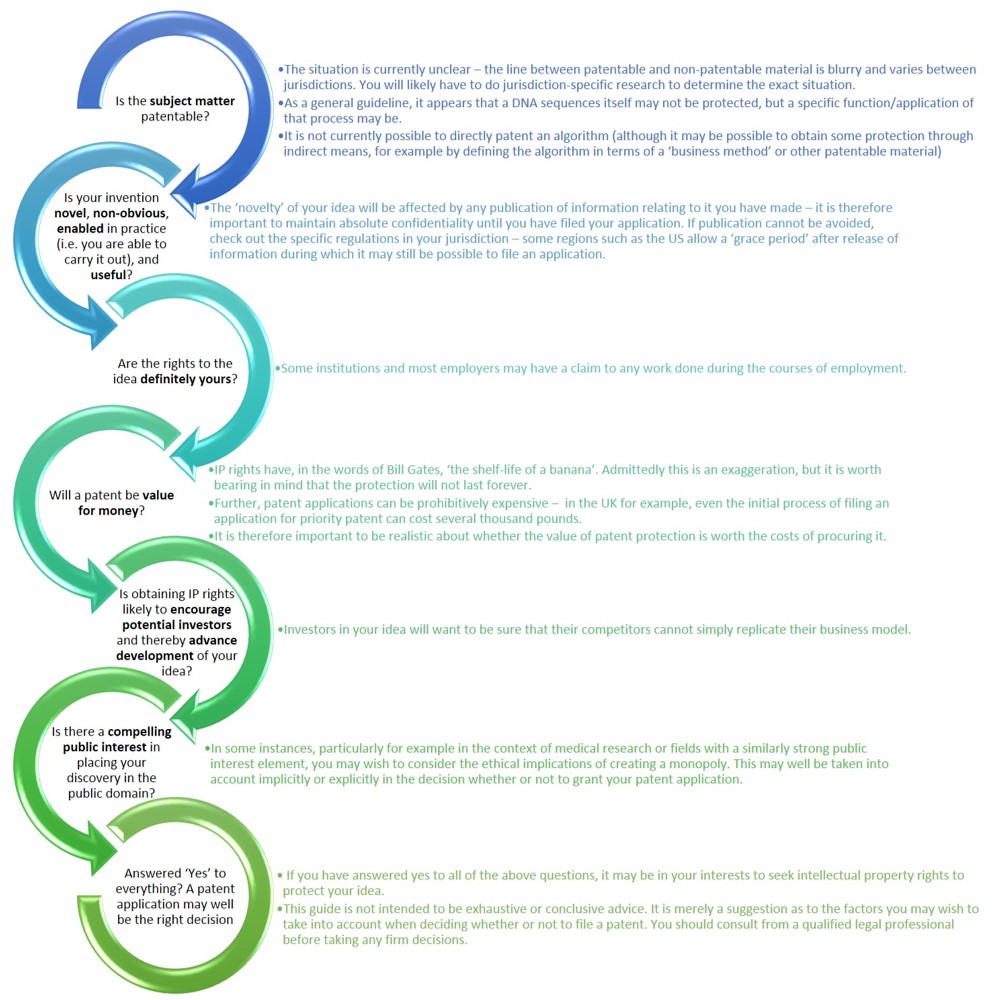Team:Oxford/topsecretIPpage
From 2014.igem.org
| Line 10: | Line 10: | ||
<br> | <br> | ||
[[File:OxiGEM IP.jpg|350px|right|alt text]] | [[File:OxiGEM IP.jpg|350px|right|alt text]] | ||
| - | <p>Intellectual Property is an increasingly important and controversial aspect of scientific advance, and synthetic biology is perhaps the paradigmatic area | + | <p>Intellectual Property is an increasingly important and controversial aspect of scientific advance, and synthetic biology is perhaps the paradigmatic area illustrating the effects of this growing legal influence. When thinking about how teams could turn their ideas from iGEM projects into viable real-world solutions, we realized that intellectual property is a crucial area to address. Our team has produced a report exploring how teams can approach this task and how iGEM intellectual property policy can make the transition easier. <br> |
We begin with a brief overview of current intellectual property law (specifically relevant to the UK) before progressing to look at the challenges this poses for the iGEM competition. A number of different approaches which iGEM might choose to adopt towards intellectual property are discussed and the pros and cons of each are assessed. We then asked a range of interested groups, including iGEM students, professionals, and the public, for their views before arriving concluding with recommendations for addressing intellectual property concerns in iGEM. <br> | We begin with a brief overview of current intellectual property law (specifically relevant to the UK) before progressing to look at the challenges this poses for the iGEM competition. A number of different approaches which iGEM might choose to adopt towards intellectual property are discussed and the pros and cons of each are assessed. We then asked a range of interested groups, including iGEM students, professionals, and the public, for their views before arriving concluding with recommendations for addressing intellectual property concerns in iGEM. <br> | ||
| - | This page features | + | This page features summarises the conclusions the report; the complete document can be downloaded below. </p> |
<html> | <html> | ||
<center><iframe src="http://files.flipsnack.com/iframe/embed.html?hash=ft9yds58&wmode=transparent&t=1409550085" width="854" height="480" seamless="seamless" scrolling="no" frameborder="0" allowtransparency="true"></iframe></center> | <center><iframe src="http://files.flipsnack.com/iframe/embed.html?hash=ft9yds58&wmode=transparent&t=1409550085" width="854" height="480" seamless="seamless" scrolling="no" frameborder="0" allowtransparency="true"></iframe></center> | ||
Revision as of 14:24, 1 September 2014
Intellectual Property
Intellectual Property is an increasingly important and controversial aspect of scientific advance, and synthetic biology is perhaps the paradigmatic area illustrating the effects of this growing legal influence. When thinking about how teams could turn their ideas from iGEM projects into viable real-world solutions, we realized that intellectual property is a crucial area to address. Our team has produced a report exploring how teams can approach this task and how iGEM intellectual property policy can make the transition easier.
We begin with a brief overview of current intellectual property law (specifically relevant to the UK) before progressing to look at the challenges this poses for the iGEM competition. A number of different approaches which iGEM might choose to adopt towards intellectual property are discussed and the pros and cons of each are assessed. We then asked a range of interested groups, including iGEM students, professionals, and the public, for their views before arriving concluding with recommendations for addressing intellectual property concerns in iGEM.
This page features summarises the conclusions the report; the complete document can be downloaded below.
What is Intellectual Property?
There are four main types of intellectual property - patent, copyright, know-how, and business secret. <p> The table below compares the benefits and possible drawbacks of each...
Should I file a patent application?
Deciding whether to file a patent application can be a tricky decision - below are just some of the factors you might want to take into consideration...
Conflicting Effects of IP Protection
Incentivising Innovation
Early studies based on data from individual countries found that patents positively influenced innovation by 15-25%. 2
Encouraging Openness
Creation of Monopoly
Other research expresses concern that patents on initial discoveries may delay, hamper, and deter innovations building on this patented work. 3
...But the paper warns against the dangers of continuing to analyse IP issues from within the 'innovation versus access' paradigm/dichotomy.
 "
"


